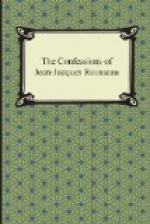them over for the purpose of seeing whether or not
I could find those which ought to fill up the void.
This experiment did not succeed. I perceived
the vacancy to be real, and that the letters had certainly
been taken away. By whom and for what purpose?
This was what I could not comprehend. These
letters, written prior to my great quarrels, and at
the time of my first enthusiasm in the composition
of ‘Eloisa’, could not be interesting
to any person. They contained nothing more than
cavillings by Diderot, jeerings from De Leyre, assurances
of friendship from M. de Chenonceaux, and even Madam
d’Epinay, with whom I was then upon the best
of terms. To whom were these letters of consequence?
To what use were they to be put? It was not
until seven years afterwards that I suspected the
nature of the theft. The deficiency being no
longer doubtful, I looked over my rough drafts to
see whether or not it was the only one. I found
several, which on account of the badness of my memory,
made me suppose others in the multitude of my papers.
Those I remarked were that of the ‘Morale Sensitive’,
and the extract of the adventures of Lord Edward.
The last, I confess, made me suspect Madam de Luxembourg.
La Roche, her valet de chambre, had sent me the papers,
and I could think of nobody but herself to whom this
fragment could be of consequence; but what concern
could the other give her, any more than the rest of
the letters missing, with which, even with evil intentions,
nothing to my prejudice could be done, unless they
were falsified? As for the marechal, with whose
friendship for me, and invariable integrity, I was
perfectly acquainted, I never could suspect him for
a moment. The most reasonable supposition, after
long tormenting my mind in endeavoring to discover
the author of the theft, that which imputed it to D’Alembert,
who, having thrust himself into the company of Madam
de Luxembourg, might have found means to turn over
these papers, and take from amongst them such manuscripts
and letters as he might have thought proper, either
for the purpose of endeavoring to embroil me with
the writer of them, or to appropriate those he should
find useful to his own private purposes. I imagined
that, deceived by the title of Morale Sensitive, he
might have supposed it to be the plan of a real treatise
upon materialism, with which he would have armed himself
against me in a manner easy to be imagined.
Certain that he would soon be undeceived by reading
the sketch and determined to quit all literary pursuits,
these larcenies gave me but little concern.
They besides were not the first the same hand
[I had found in his ‘Elemens de Musique’ (Elements of Music) several things taken from what I had written for the ‘Encyclopedie’, and which were given to him several years before the publication of his elements. I know not what he may have had to do with a book entitled ‘Dictionaire des Beaux Arts’ (Dictionary of the Fine Arts) but I found in it articles




